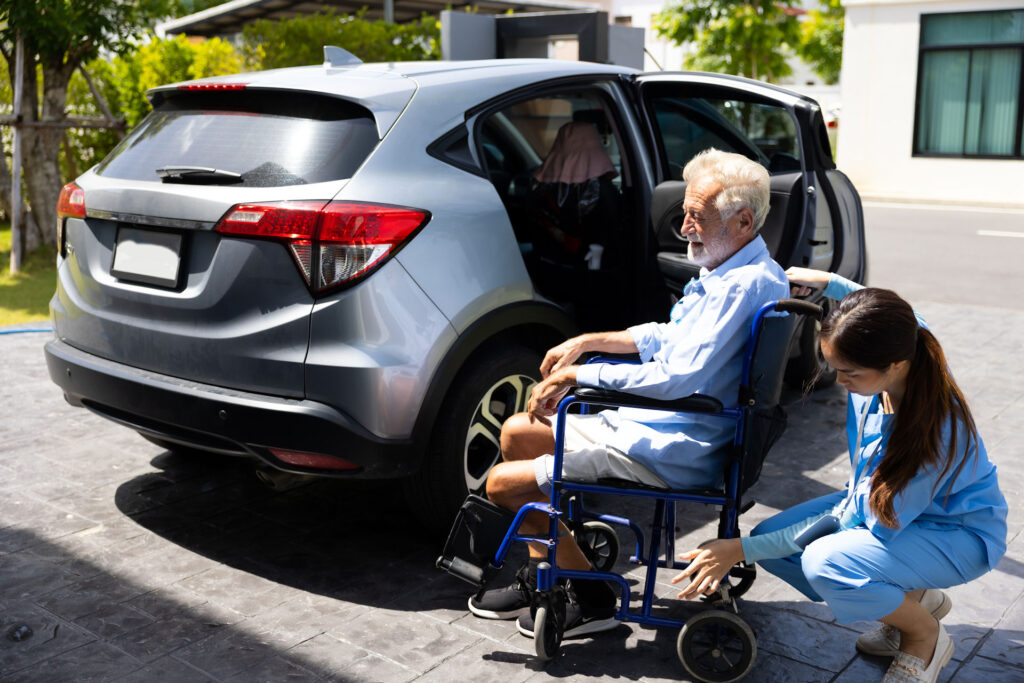Laguna Shores Recovery arranges for a car to pick you up right from your front door and take you directly to our addiction recovery center. This service aims to eliminate transportation barriers, making it easier for individuals to access the life-changing treatment they deserve.
Lack of Transportation Keeps Many From Addiction Treatment
 When you finally decide to take that first step toward recovery, limited transportation options emerge as a significant barrier. Getting people to reach out for help or go to a rehab facility also becomes a challenge. Public transit schedules and routes often do not align with the demanding schedules of residential treatment or intensive outpatient treatment programs. This lack of viability prevents countless individuals from accessing potentially life-saving care.
When you finally decide to take that first step toward recovery, limited transportation options emerge as a significant barrier. Getting people to reach out for help or go to a rehab facility also becomes a challenge. Public transit schedules and routes often do not align with the demanding schedules of residential treatment or intensive outpatient treatment programs. This lack of viability prevents countless individuals from accessing potentially life-saving care.In rural areas, where public transportation is often scarce or nonexistent, individuals may struggle even more profoundly. Long distances to treatment centers, coupled with the absence of affordable transportation options, can isolate those in need of help, exacerbating their addiction struggles. Additionally, financial constraints may prevent individuals from accessing private transportation services or covering the costs of gas for personal vehicles.
Even in urban settings where public transportation is more readily available, challenges persist. Inadequate public transit routes, long wait times, and inconvenient schedules can deter individuals from consistently attending treatment sessions. For some, the stigma associated with using public transportation for addiction treatment purposes may also serve as a barrier, further complicating their journey toward recovery.
Addressing transportation barriers to addiction treatment requires a multifaceted approach. Community organizations, government agencies, and healthcare providers must collaborate to develop solutions such as subsidized transportation services, telemedicine options, and mobile treatment units. Additionally, raising awareness about the importance of transportation access in addiction recovery and advocating for policy changes to improve transportation infrastructure are crucial steps toward ensuring equitable access to treatment for all individuals in need. By addressing transportation barriers, we can help more individuals overcome addiction and lead healthier, more fulfilling lives.
The Benefits of Rehab Transportation Services
Arranging transportation to rehab allows patients to focus on their recovery rather than logistical challenges. Rehab centers that offer transportation services make the process seamless by picking patients up from their location and bringing them directly to the facility. This convenience and accessibility enable more patients to pursue and commit to treatment.
Rehab vehicles and drivers are properly licensed, insured, and trained to safely transport patients. Patients can rest assured that their privacy and confidentiality will be respected during the ride. The vehicles used are discreet, with no markings to indicate their purpose. Patients are transported directly to the rehab facility, avoiding public attention.
The anticipation of entering rehab can provoke feelings of stress and anxiety for many patients. Not having to worry about transportation arrangements helps alleviate additional worries and allows patients to focus on the recovery journey ahead. Patients may find comfort in familiar vehicles and drivers during return trips, aiding their post-treatment adjustment and recovery process.
Rehab centers aim to make the treatment process as seamless as possible. Providing door-to-door transportation is an extension of this continuity of care. Patients are supported from the moment they decide to pursue treatment through their journey to recovery. Drug transportation rehab is a service that eases patients into the treatment process and aids their transition back to everyday life post-discharge. Overall, rehab transportation bridges the gap between patients’ homes and the help they need.
Rehab center transportation services help patients travel and offer vital support and accountability, enhancing their recovery journey. The presence of a trained driver who understands the challenges of recovery can offer encouragement and reassurance during the journey. Designated pickup times for transportation to our rehab locations ensure patients stick to treatment schedules, fostering accountability and commitment to the recovery process.
Rehab transportation services may include access to specialized amenities that cater to the unique needs of patients. For example, vehicles equipped with comfortable seating, climate control, and amenities like refreshments or entertainment options can contribute to a more pleasant and comfortable journey. Such amenities improve the patient experience and foster a positive mindset as they begin their journey towards recovery.
Risks of Using Public Transportation for Rehab
 Using public transportation as a mode of travel during rehabilitation comes with its own set of risks, both physical and logistical. While it may offer convenience and accessibility, particularly for those without personal means of transportation, individuals undergoing rehabilitation face potential challenges ranging from the risk of injury during transit to difficulties adhering to scheduled appointments and managing specialized equipment or mobility aids in crowded and often unpredictable environments.
Using public transportation as a mode of travel during rehabilitation comes with its own set of risks, both physical and logistical. While it may offer convenience and accessibility, particularly for those without personal means of transportation, individuals undergoing rehabilitation face potential challenges ranging from the risk of injury during transit to difficulties adhering to scheduled appointments and managing specialized equipment or mobility aids in crowded and often unpredictable environments.Using public transit broadcasts to strangers that you are traveling to rehab. This can compromise your privacy when seeking treatment. Addiction is a disease that unfortunately still carries a social stigma, and you may not wish for your journey to become public knowledge.
Public transit exposes you to large crowds in confined spaces, increasing the chance of contact with airborne illnesses like the common cold or flu. For those with compromised immune systems due to substance abuse, this poses health risks that could delay or disrupt treatment. There is also a chance of physical injury if the transit experience is stressful or chaotic.
Using public transit for long distances during rehab can provoke stress, anxiety, and uncertainty due to the unfamiliar experience. The additional mental burden is unhelpful for beginning recovery and may exacerbate withdrawal symptoms. Private, door-to-door transportation helps ensure a smooth, stress-free journey to rehab.
Public transit operates on fixed schedules and routes outside of your control. This loss of control and uncertainty about journey time can be distressing when you are trying to take a major step toward regaining control of your health and life by entering rehab. Private transportation gives you more control and predictability over your travel experience.
Public rehab transport can be financially strained if treatment centers are distant, demanding more resources for commuting expenses. While public transit may seem cost-effective at first glance, frequent trips can quickly add up in terms of fares or ticket prices. Moreover, if the rehab facility is not easily accessible via public transportation, you may need to rely on additional modes of transit, such as taxis or rideshare services, further increasing the financial burden.
How Does Rehab Transport Protect Patient Privacy?
- Confidentiality Agreements: Rehab transport companies typically have strict confidentiality agreements in place that all staff members must adhere to. These agreements outline the importance of patient privacy and the consequences of breaching it.
- Secure Communication: Any communication regarding patient transport or medical information is conducted through secure channels. This may involve encrypted messaging systems or secure phone lines to prevent unauthorized access.
- Limited Access: Only authorized personnel are allowed access to patient information. This ensures that sensitive data is only shared with those directly involved in the patient’s care or transportation.
- Compliance with Regulations: Rehab transport services adhere to relevant privacy regulations, such as HIPAA (Health Insurance Portability and Accountability Act) in the United States. This includes implementing safeguards to protect patient information from unauthorized access or disclosure.
- Proper Training: Staff members receive training on the importance of patient privacy and how to handle sensitive information appropriately. This training emphasizes the need to maintain confidentiality at all times.
- Use of Discretion: Rehab transport personnel exercise discretion when discussing patient information, both in verbal communication and written documentation. They are trained to avoid sharing unnecessary details and to only disclose information on a need-to-know basis.
Drug Rehab Transportation is Available When You’re Ready
Luckily, there are various transportation services available specifically designed to cater to individuals seeking drug rehab treatment. By offering this assistance, drug rehab transportation helps remove a significant barrier to treatment and allows individuals to focus on their recovery journey without the added stress of arranging transportation. Whether it is a shuttle service, public transportation vouchers, or partnerships with local transport providers, these services are committed to ensuring that individuals have the means to get the help they need when they are ready for it.
Laguna Shores Recovery Offers Drug Rehab Transportation Services
 At Laguna Shores Recovery, we understand that taking the first step toward recovery can be daunting, especially when transportation barriers stand in the way. That’s why we offer comprehensive drug rehab transportation services to support you on your journey to healing.
At Laguna Shores Recovery, we understand that taking the first step toward recovery can be daunting, especially when transportation barriers stand in the way. That’s why we offer comprehensive drug rehab transportation services to support you on your journey to healing.When you’re ready to embark on this path to recovery, our dedicated team is here to ensure you have the means to access the support and treatment you need. Whether you require assistance arranging transportation or need resources for public transit, we are committed to removing any obstacles that may hinder your progress.
Don’t let transportation challenges prevent you from seeking the help you deserve. Contact us at Laguna Shores Recovery today and take that crucial first step towards a brighter, healthier future. We’re here to support you every step of the way.

 Matthew Beck B.A, M.A, LMFT
Matthew Beck B.A, M.A, LMFT 


